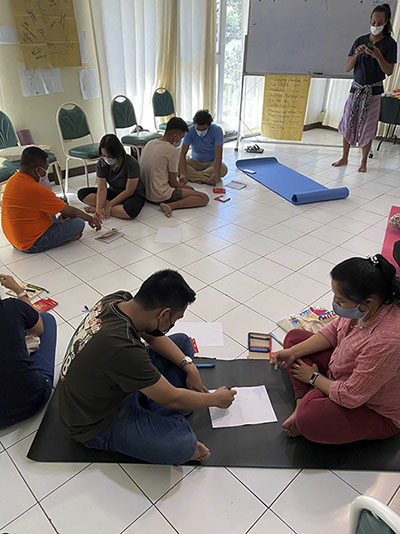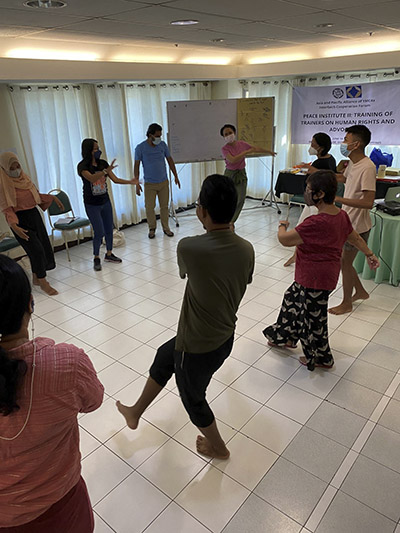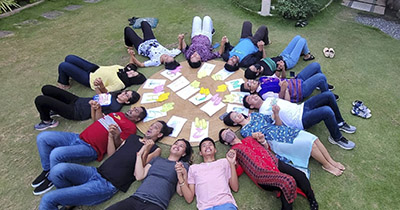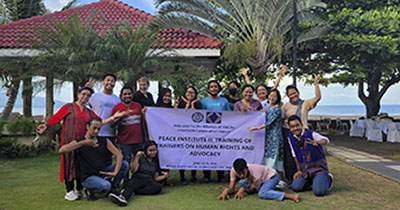ICF Training of Trainers on Human Rights and Advocacy
Last Updated (Monday, 01 August 2022 12:26)
From June 14 to 25, 2022, the Interfaith Cooperation Forum held a Peace Institute- Training of Trainers in the Philippines. ICF welcomed 10 students and one observer-participant from 7 countries, including Bangladesh, Cambodia, Laos, Nepal, Philippines, Timor-Leste, and Việt Nam, who came to Dumaguete City to join the training of trainers workshop. The training theme was Human Rights and Advocacy. The training was anchored on the hope of young people creating a peaceful and sustainable world together. ICF invited the following facilitators to lead various sessions: Ms Dessa Quesada-Palm, a theatre artist and head of the National Committee on Dramatic Arts of the National Commission for Culture and the Arts; Carlton "Cobbie" Palm, a Presbyterian Church-USA Mission Co-Worker born in Dumaguete, and Ernest Hope Tinambacan, a theatre artist and songwriter. The Peace Institute students have successfully completed the course with many memorable experiences.
What did we learn during the 10-day training?
1. We learned deeply as we clustered human rights into categories.
We approached and analyzed the development and the provisions of the United Nations Charter and the basic provisions of the Universal Declaration of Human Rights (UDHR). We studied major human rights covenants and protocols, such as the International Covenant on Civil and Political Rights (ICCPR), and the International Covenant on the Economic, Social, and Cultural Rights (ICESCR). Political Rights are the contents of the law of people's participation in politics and governance. Civil rights are the content of the judiciary and penal systems. These are the rights that protect Justice. Social rights guarantee a healthy quality of life for all persons, while economic rights guarantee meaningful work, production, and services. Cultural rights are the guarantees of cultural respect and freedom, and collective rights are the guarantees of the state to protect the environment and natural resources.
The participants had an open space to discuss, do in-depth research, and relate to the implementation and practice of the ICCPR and ICESCR in different countries. In addition, the class also approached international organizations that protect human rights and proposed solutions from a multi-dimensional perspective on multiculturalism among different countries and religions.
2. We gained skills in applying theatre art in human rights advocacy
During the sessions, the participants engaged in collective activities to awaken and connect to the different parts of the body. The exercises enabled the participants to explore and develop ways of using theatre art as an effective tool or method to advocate and promote human rights. We experimented on the elements of theatre forum, storytelling, and simulation of human rights abuse situations and short plays. The participants also learned from their fellows concerning the issues in each country, such as red-tagging, freedom of speech, sea pollution, gender equality, etcetera.
 |  |
3. Creating a teaching module on specific Human Rights issues using theatre art
The participants distinguished the difference between the role of trainers and the facilitators. They also learned theories on working with different types of learners and building different teaching frameworks to achieve the best results for different target groups. With the guidance of the facilitators, the participants worked together in groups and created their built teaching modules on different human rights topics, following the training circle format:
(1) Identifying training needs (TNA)
(2) Establishing the training objectives
(3) Designing and Planning the Training
(4) Delivering the actual training activity, and
(5) Evaluating the training activity.
On June 25th, the participants had practicum sessions and directly interacted with youth and students in three different communities. One group went to the local church of the United Church of Christ in the Philippines (UCCP) in Sibulan to do their practicum with the church youth. Another group went to Little Children of the Philippines, a shelter for abandoned children. The third group went to the UCCP local church in Dumaguete City and had their practicum with the church youth and the youth from an NGO called Les Enfants du Mekong. This gave the participants the opportunity to apply the knowledge and practice the skills gained during the training. It also helped the participants better understand the local human rights issues. The practice sessions have left many memorable experiences for the local young people and participant-trainees.
In addition, the participants also had an opportunity to join the worship service at Silliman University Church. They had time for bonding and connecting with nature in Negros to understand more about the local culture, landscapes, and local issues.
“The course not only brings knowledge to me but also serves as a daily reminder of our hope for a better world every day," a participant shared.
 |  |
By Viet Hang Nguyen
ToT Participant, Vietnam
